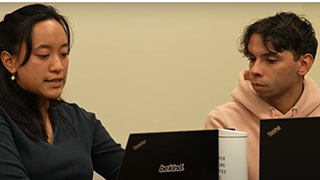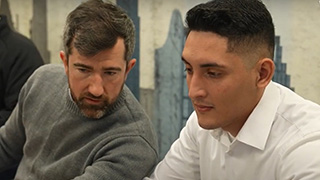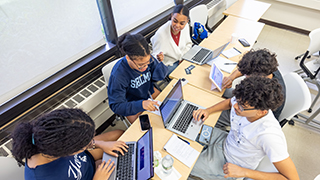The DiploLab: A Place for Research, Collaboration and Learning
Tuesday, April 9, 2024
 The DiploLab is a collaborative research space where undergraduate students can engage with faculty
and work together to develop and advance both ongoing and new research projects. It’s
a program that encourages students to explore their interests related to international
relations and apply what they are learning beyond the classroom.
The DiploLab is a collaborative research space where undergraduate students can engage with faculty
and work together to develop and advance both ongoing and new research projects. It’s
a program that encourages students to explore their interests related to international
relations and apply what they are learning beyond the classroom.
Alaa’a Ashkar, a junior at the School of Diplomacy and International Relations, and senior Hamzah Khan are among the students working in the DiploLab this semester. For Alaa’a, the DiploLab is a place to "collaborate with my fellow colleagues, research and brainstorm ideas for articles, research papers or op-eds. It just depends on what our interests are and what we want to do." Students go on to write up their research and have it published. For Ashkar, the open and collaborative atmosphere of the DiploLab is one of the best aspects of the program. Although she started out as a creative writing afficionado, Ashkar’s work in the lab has helped strengthen her academic writing and research skills.
Hamzah Khan also feels that the DiploLab has developed many of his skills. As a member of the Model UN team and a contributor to the Diplomatic Envoy, the School’s student-run newspaper, Khan has gained significant writing experience in college. "I didn’t have a research background and I’m not into data science," Khan explains. The team conducts data analysis as part of their investigations and works closely with Professor Joey Huddleston, the founder of DiploLab, on research for his books and articles. Khan says that he’s had access to "a lot of research [tools] that I usually wouldn’t get as an undergrad, like using Stata and other kinds of research software, including Atlas.ti and LexisNexis."
Khan has been a part of the DiploLab since freshman year. He started out assisting Professor Huddleston with his research focusing on separatist movements, and then moved on to working on projects with other students. For example, Khan brainstormed a social media piece on Ukraine and Russia with a fellow student. This piece ended up being published in an international digital media magazine. The chance to publish independent work is another major benefit for students who are working in the DiploLab.
Support from Graduate Research Assistants
While the lab is mainly for undergraduate students, there are opportunities for graduate
students as well. Each year, the DiploLab appoints a research assistant, one of the
many scholarships for graduate students in the School of Diplomacy. Steven Ochoa,
the current research assistant and first year graduate student, plays an important
role in facilitating communication between the undergraduate students and Huddleston,
as well as supporting the students in their research. Ochoa praised the undergraduate
researchers he’s gotten to know. "I’ve come to realize that this is a brilliant group
of students and one conversation with them can consist of a semester’s worth of knowledge.
They are very intelligent. They know what they are talking about and on top of that,
they are very passionate about their work," he said.
Speaking with the students and learning about their research aspirations is his favorite part of the job, Ochoa says. "They are just so knowledgeable and you get different perspectives and different views. You also see how their thought processes work in terms of how they organize what they are working on. Seeing students do what they do is definitely the best part."
A Pivotal Experience
Professor Huddleston also recognizes the talents of the students and their dedication
to their research projects. "Students in DiploLab come from an incredible diversity
of backgrounds, but there are a few common factors. Nobody is afraid of working, working
consistently, working under deadlines. And everyone is aware that their work will
be critiqued, and nothing is going to be rubber-stamped."
Huddleston launched the DiploLab in 2019 to create opportunities for undergraduates to gain complex research experience . "I decided to start the DiploLab here because I saw that Seton Hall’s student body was very diverse, in terms of background, interest, and preparation for [future] careers." Students who might be the first generation in their family to go to college and or who may not be aware of research-related career paths, benefit from the program.
"Creating opportunities for all students to get personally involved in research has been invaluable," Huddleston explains. "Faculty also get a chance to work with aspiring researchers and writers. It’s a win-win scenario for both."
Although students gain skills that are helpful in college, their DiploLab experiences can also influence their future careers. For example, Alaa’a Ashkar plans to work in the legal field, where her strong writing and research skills will be an asset. Ashkar says that her exposure to social science research has inspired her to consider a career in research or academics. "Now that I’ve dipped into it, I’ve realized the importance of academia and just wanting my name out there on a research paper or an op-ed."
Similarly, Hamzah Khan found his horizons broadened through his DiploLab experience. He’s now exploring opportunities in data analysis within the international relations and humanities fields. "I thought the only opportunities were becoming a diplomat or going to law school, but there are so many careers in data analysis that are available, and I think that the skills that I’ve gained here definitely give me an edge to pursue that. I don’t necessarily know if I’m going to go to grad school or not, but I think the foundation that I’ve gained here is going to help me a lot in the future."
 The work of DiploLab students has been published in media outlets such as Foreign Policy and the Washington Post. The current cohort has plans for new projects in the future. In addition to working
with faculty on their research projects, they also take the time to pitch and develop
their own passion projects. For example, students have interests ranging from democratic
backsliding in Hungary and Turkey, to the role of media in the Israeli-Palestine conflict,
to ethnic conflict in Africa. These independent projects reflect the numerous interests
of the undergraduates and their willingness to dive into different topics.
The work of DiploLab students has been published in media outlets such as Foreign Policy and the Washington Post. The current cohort has plans for new projects in the future. In addition to working
with faculty on their research projects, they also take the time to pitch and develop
their own passion projects. For example, students have interests ranging from democratic
backsliding in Hungary and Turkey, to the role of media in the Israeli-Palestine conflict,
to ethnic conflict in Africa. These independent projects reflect the numerous interests
of the undergraduates and their willingness to dive into different topics.
Joining the DiploLab
The DiploLab is an amazing opportunity for undergraduate students to learn valuable
research skills and gain an edge in their college and professional careers. Professor
Huddleston offered a few words of advice for students who might be interested in joining
the DiploLab: "If you want to get into DiploLab, there are a couple things to know.
We usually only recruit sophomores and juniors. Getting in is competitive. We do a
call for applications in the spring. We’ll look at grades, career interests, goals,
etc."
Whether students choose to apply for this opportunity or not, however, Huddleston emphasized the importance of research in general: "Learning how to do research, the process of going through developing your ideas and testing them, it sharpens you in all other aspects of life as well. It makes you take ideas more seriously in general and interrogate ideas." It makes you think: "What does this mean? What does it imply? I think it’s a very good way of honing your critical thinking skills. So even if you can’t do it with DiploLab, take your research projects very seriously and try to apply what you learn."
If you are an undergraduate or prospective student and would like more information on the DiploLab and to see some of their published material, you can check out the website and view the video.
One final note from Professional Huddleston: DiploLab recruits students at the end of spring semester, with new lab members starting in the following fall semester. Students interested in joining the lab should keep an eye out for a recruitment announcement in their email inboxes in the final few weeks of the spring semester and follow the application instructions. For information, email Professor Huddleston at [email protected].
Categories: Nation and World, Research






